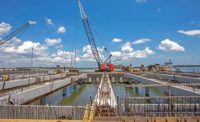A decision by Florida Gov. Rick DeSantis (R) and the three-member state Cabinet has cleared a controversial $1-billion highway extension in Miami-Dade County to begin the environmental permitting process, even as the project’s long-term prospects remain in doubt.
On Sept. 21, DeSantis joined a majority of Cabinet members in formally rejecting a state administrative law judge’s 2020 recommendation against moving forward with a proposed 13-mile extension of the SR 836/Dolphin Expressway, also known as the Kendall Parkway. First proposed in 2012, the estimated $1-billion, six-lane expressway was envisioned as way to ease congestion and improve commuting times in the county’s growing western suburbs.
The proposal drew immediate and intense opposition from conservation groups, as the expressway would breach the county’s Urban Development Boundary established to prevent encroachment on wetlands and other environmentally sensitive land located on the fringes of Everglades National Park. One such area, the 12.5-square-mile Bird Drive Basin, also helps recharge the Biscayne Aquifer, a source of drinking water for Miami-Dade County.
In addition, project opponents claimed that the expressway’s approval violated commitments to reduce sprawl and promote mass transit in the county’s comprehensive development master plan.
These arguments formed the basis of a legal challenge by the Tropical Audubon Society and area residents to Miami-Dade County’s September 2018 approval of the project. In March 2020, Florida Administrative Law Judge Suzanne Van Wyk found that while the approval did not violate county conservation practices, the SR836 extension’s potential effects on the Everglades remained questionable, particularly since the South Florida Water Management District had not been provided with sufficient information to fully evaluate environmental impacts.
Van Wyk also agreed with the plaintiffs’ contention that the SR836 extension would provide only minor benefit to area mobility or accessibility to area employment centers. She cited traffic studies that forecast only a six-minute reduction for a typical two-hour commute. Van Wyk recommended that the State Administration Commission, composed of the governor and the cabinet, issue an order finding the project inconsistent with state planning laws.
At a June 2021 meeting, the commission rejected that recommendation, agreeing with Miami-Dade’s argument that new environmental policies for the project’s design exceed mitigation and protection measures already in place. In his presentation to the commission, assistant county attorney Dennis Kerbel noted that the road could be built in a way consistent with a planned water-conveyance canal for Bird Drive Basin as part of the Everglades restoration program.
Kerbal called Miami-Dade County’s 2018 approval “the beginning of the road, not the end” for the SR836 extension, adding that the project’s final designs are subject to additional required regulatory reviews that will provide opportunities to conclusively address plaintiffs’ concerns.
DeSantis issued no statement following the Sept. 21 vote formalizing the earlier decision to reject Van Wyk’s recommendation. He stated during the June meeting that assumptions regarding the project’s ultimate approval were “premature.” He also voiced doubt at the time that the South Florida Water Management District would approve the project.
The Miami-Dade County Expressway Authority did not respond to a request for comment on the decision, nor has it announced a timeline for proceeding with the SR836 extension. That process may be short-lived, however, as opponents have already announced plans to appeal the cabinet’s decision.
Tropical Audubon executive director Paola Ferreira asserts that the final order “erroneously changes” Judge Van Wyk’s findings of fact to approve construction of the SR836 extension and sets a precedent for further urban infrastructure construction outside the urban development boundary.
She adds, “It would allow the county to decide what is required for Everglades restoration and seriously compromise” investments that have already been made.




Post a comment to this article
Report Abusive Comment